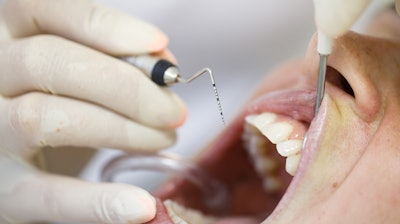
The extent, severity, and progression rate of periodontitis may not significantly affect implant treatment, according to research recently published in the Journal of Stomatology, Oral and Maxillofacial Surgery.
Among patients with periodontitis, the failure rate was estimated to be 5.6%, according to the authors.
"Periodontitis extent, severity, and rate of progression were not significantly associated with the implant treatment outcome," wrote the authors, led by Dr. Georgios S. Chatzopoulos of the University of Minnesota School of Dentistry (J Stomatol Oral Maxillofac Surg, October 22, 2024, 102123).
For the study, dental records from U.S. adult patients who sought implants from university dental clinics participating in the BigMouth network from 2011 to 2022 were evaluated. Records were reviewed for periodontal diagnoses based on the 2017 World Workshop on the Classification of Periodontal and Peri-Implant Diseases and Conditions, they wrote.
Patients were categorized by the extent of periodontitis (generalized or localized), severity (stages I-IV), and progression rate they had. Demographic information, self-reported medical conditions, and the number of missing teeth were gathered from electronic health records. Over 12 years, 50,312 dental implants were placed in 20,842 patients, with 322 implants placed in patients diagnosed with periodontitis. The cohort's mean age was approximately 58.
The univariate analysis showed no significant association between treatment outcomes and periodontitis extent (p = 0.47), severity (p = 0.30), or progression rate (p = 0.68). A subgroup analysis comparing implant outcomes between patients with generalized severe periodontitis (generalized extent and stage III/IV) and those with a localized, milder form of the disease (stage I/II) also found no significant differences (p = 0.43). The study's authors estimated the implant failure rate to be 5.6 %, according to the study.
The study had limitations. It did not include information on implant and site characteristics, including bone quality, type, implant surface, dimensions, and prosthesis type, the authors wrote.
"Within the limitations of this retrospective study that utilized records of dental implants placed in institutions in the United States contributing data to the BigMouth network, periodontitis extent, severity, and rate of progression were not significantly associated with the implant treatment outcome," Chatzopoulos and co-author Dr. Larry F. Wolff, MS, PhD, concluded.




















